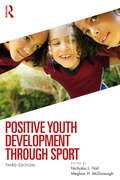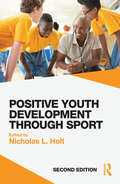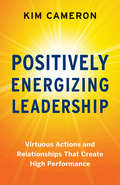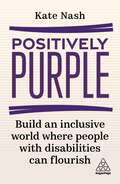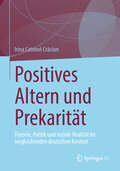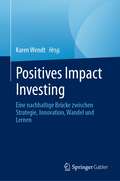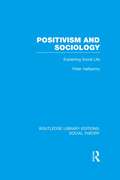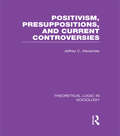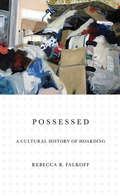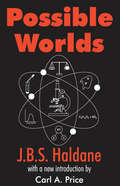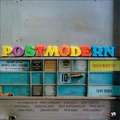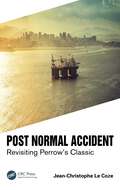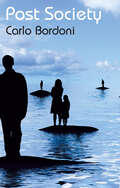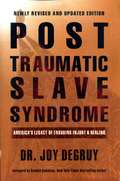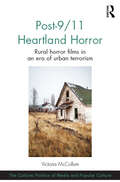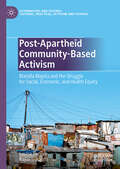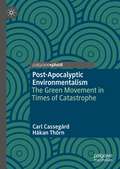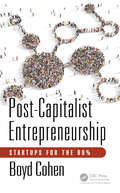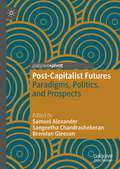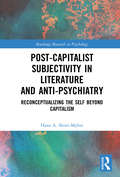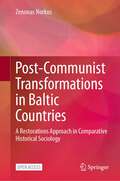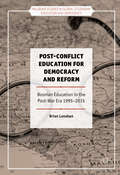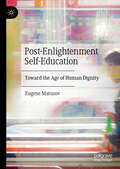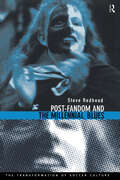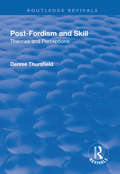- Table View
- List View
Positive Youth Development through Sport
by Nicholas L. Holt Meghan H. McDonoughCutting through the political rhetoric about the power of sport as a tool for social change and personal improvement, this book offers insight into how and why participating in sport can be good for children and young people.Still the only book to focus on the role of sport in positive youth development (PYD), it brings together high-profile contributors from diverse disciplines to critically examine the ways in which sport can be used to promote youth development. Now in a fully updated, revised, and expanded third edition, Positive Youth Development through Sport covers a wider range of disciplines including sport psychology, development psychology, physical education, sport development, and sport sociology. With every chapter asking why, what, so what, and what next, the book introduces the theoretical basis and historical context of PYD, quantitative and qualitative methods for assessing PYD in sport, and the potential of PYD in sport across different ages and abilities. This edition includes brand-new chapters on PYD in schools, in Indigenous populations, and across the lifespan, as well as new material on evaluating PYD programs and new case studies of PYD around the world.This is invaluable reading for all students, researchers, educators, practitioners, programmers, and policy makers with an interest in youth sport.
Positive Youth Development through Sport: second edition (Routledge Studies In Physical Education And Youth Sport Ser.)
by Nicholas L. HoltCutting through the political rhetoric about the power of sport as a tool for social change and personal improvement, this book offers insight into how and why participating in sport can be good for children and young people. As the first text to focus on the role of sport in positive youth development (PYD), it brings together high-profile contributors from diverse disciplines to examine critically the ways in which sport can be used to promote youth development. Now in a fully updated, revised and expanded new edition, Positive Youth Development through Sport covers a wider range of disciplines including sport psychology, development psychology, physical education, sport development and sport sociology. Its three main sections focus on: the theoretical and historical contexts of PYD quantitative and qualitative methods for assessing PYD in sport the potential of PYD in sport across different ages and abilities. With expanded guidance on how to apply positive youth development in practice, this is essential reading for all students, researchers, educators, practitioners and policy makers with an interest in youth sport.
Positively Energizing Leadership: Virtuous Actions and Relationships That Create High Performance
by Kim CameronThis practical guide, the first to show how leaders can achieve extraordinary results through the positive energy generated by virtuous interactions with employees, is written by one of the giants in the study of positive leadership. This book reveals one of the most important but frequently ignored factors that lead to spectacular performance in organizations. Kim Cameron, a true pioneer in the study of positive leadership, offers validated scientific evidence that all individuals are inherently attracted to and flourish in the presence of positive energy, a principle known in biology as heliotropism. Further, he shows that the positive relational energy generated by leaders' virtuous behaviors—such as generosity, compassion, gratitude, trustworthiness, forgiveness, and kindness—is tightly linked to extraordinary organizational outcomes like greater innovation, higher profits, and increased engagement and retention. Cameron has not written a feel-good tome about the power of positive thinking, "happiology," or unbridled optimism. This research-based explanation shows how to achieve performance that exceeds expectations. He provides practical suggestions, assessments, and exercises showing how leaders can improve their own positive energy and increase positive relational energy in their organizations. Positively Energizing Leadership is a major contribution to the theory and practice of leadership.
Positively Purple: Build an Inclusive World Where People with Disabilities Can Flourish
by Kate NashMost employers will have a workforce where at least 10% of their people will have a visible or invisible disability. And 86% of all disabled people acquire their disability during the course of their working lives. How can businesses create strategies and a company culture that includes all staff?Ensure that your company or organization doesn't become guilty of the soft bigotry of low expectations when it comes to disabled employees and customers. Learn from your disabled staff and consumers and be equipped to be a better and more dynamic organization.Kate Nash, founder of #PURPLELIGHTUP - a global movement which celebrates the economic contribution of employees with disability - will help you understand how any organization can ensure disabled staff and consumers are included and valued. Telling a fascinating story of how to make change happen and recognizing that any kind of transformation requires knowledge, determination and hard yards of campaigning, networking and deal making, you will learn how to build disability confidence throughout your organization.Positively Purple allows disabled workers to claim their rightful place centre stage as just another valuable member of the team.
Positives Altern und Prekarität: Theorie, Politik und soziale Realität im vergleichenden deutschen Kontext
by Irina Catrinel CrăciunDieses Buch untersucht positives Altern aus der Perspektive der Prekarität und zielt darauf ab, Theorien des positiven Alterns in aktuellen sozialen Kontexten zu verankern. In den letzten Jahren war die Forschung zum Thema Altern von wachsenden Meinungsverschiedenheiten zwischen Befürwortern des Modells des erfolgreichen Alterns und kritischen Gerontologen geprägt, die auf die zunehmenden Ungleichheiten, Benachteiligungen und die Prekarität hinweisen, die das Alter charakterisieren. Dieses Buch schließt eine Wissenslücke, indem es eine alternative Sichtweise auf positives Altern bietet, die durch Prekarität und deren Auswirkungen auf Projektionen zum Thema Altern informiert ist. Der erste Teil des Buches stellt das Altern in einen breiteren theoretischen und empirischen Kontext und untersucht die komplexen Zusammenhänge zwischen Ansichten über das Altern, Theorien des erfolgreichen Alterns, Politik und sozialer Realität. Der zweite Teil nutzt Ergebnisse einer qualitativen Forschung, die in Deutschland durchgeführt wurde, um die Diskrepanz zwischen den Idealen des erfolgreichen Alterns und sowohl negativen als auch positiven Ansichten über das Altern sowie Vorbereitungsstrategien auf das Altern, die durch Prekarität inspiriert sind, zu veranschaulichen. Die Ergebnisse dieses Abschnitts bieten einen soliden Ausgangspunkt für Vergleiche mit Ländern, die hinsichtlich der Wohlfahrtsregime und der Alternspolitiken sowohl Ähnlichkeiten als auch Unterschiede zu Deutschland aufweisen. Der abschließende Teil des Buches erörtert die psychologischen Implikationen dieser Ergebnisse innerhalb und außerhalb der deutschen Fallstudie und skizziert mögliche Lösungen für die Praxis. Dieses Buch bietet Gesundheitspsychologen, Gerontologen, Soziologen, Sozialarbeitern, Gesundheitsfachkräften sowie Studierenden und den älteren Menschen selbst ein besseres Verständnis für die Bedeutung des Alterns in prekären Zeiten und stärkt das Vertrauen, trotz Prekarität gut zu altern.
Positives Impact Investing: Eine nachhaltige Brücke zwischen Strategie, Innovation, Wandel und Lernen
by Karen WendtDieses Buch veranschaulicht die Auswirkungen, die eine Konzentration auf ökologische und soziale Themen sowohl auf die Risikominderung von Anlagen als auch auf die Förderung von Innovationen hat. Die Einbeziehung der Auswirkungen als neuer Eckpfeiler des Anlagedreiecks erfordert, dass Investoren und Kunden ihre Interessen und Werte aufeinander abstimmen und die Bedürfnisse verstehen. Dieser Abstimmungsprozess fungiert als Katalysator für die Veränderung der Organisationskultur innerhalb einer Organisation und initiiert somit die externe Wirkung der Organisation, aber auch ihre interne Veränderung, die wiederum die Schaffung von Wirkung verstärkt. Das Buch beschreibt, wie Kultur der soziale Klebstoff ist, der alle Disziplinen einer Organisation durchdringt, und zeigt auf, wie eine organisatorische Ausrichtung erreicht werden kann, um strategische Schnelligkeit, Innovation und Lernen zu ermöglichen, und liefert Beispiele dafür, wie Wirkung erzielt und Mitarbeiter mobilisiert werden können. Es konzentriert sich insbesondere auf Impact Investing, Impact Entrepreneurship, Innovation, De-Risking-Asset, grüne Investitionslösungen und Investorenbewegungen, um dem Klimawandel entgegenzuwirken und die Ziele für nachhaltige Entwicklung der Vereinten Nationen umzusetzen, und beleuchtet dabei Kultur, Kommunikation und Strategie.
Positivism and Sociology: Explaining Social Life (Routledge Library Editions: Social Theory #Vol. 13)
by Peter HalfpennyAny serious attempt to explain social life has to come to terms with sociology's positivist legacy. It is a heritage on the one hand from the seventeenth-century political arithmeticians and the later moral statisticians who believed that quantification would provide the basis for a dispassionate analysis of social affairs; and on the other hand from the nineteenth-century post-Enlightenment social philosophers who were eager to develop an empirical science of society that would enable them to control social conduct – just as the physical sciences had provided the knowledge to tame nature. Yet every debate about the relation between positivism and sociology is clouded by the diversity of uses of the term 'positivism' – uses that are so varied that some can pronounce positivism dead while others find it still the vital force that dominates sociology. The particular merit of Peter Halfpenny's book is that it makes this diversity of uses its central theme. In order to provide a clear basis from which to assess controversial questions about the contribution of the positivist traditions to sociology, the book reviews twelve different important uses of the term 'positivism' that have emerged at different times since the mid-nineteenth century, when Auguste Comte coined both 'positivism' and 'sociology'. This review is conducted by examining the historical development of the two independent roots of modern sociological positivism – positivist philosophy and statistics – and by analysing logical positivist philosophy, which in many ways defined the course of twentieth century philosophy of the social (as well as the natural) sciences.
Positivism, Presupposition and Current Controversies (Theoretical Logic in Sociology)
by Jeffrey C. AlexanderThis volume begins by challenging the bases of the recent scientization of sociology. Then it challenges some of the ambitious claims of recent theoretical debate. The author not only reinterprets the most important classical and modern sociological theories but extracts from the debates the elements of a more satisfactory, inclusive approach to these general theoretical points.
Possessed: A Cultural History of Hoarding
by Rebecca R. FalkoffIn Possessed, Rebecca R. Falkoff asks how hoarding—once a paradigm of economic rationality—came to be defined as a mental illness. Hoarding is unique among the disorders included in the American Psychiatric Association's DSM-5, because its diagnosis requires the existence of a material entity: the hoard. Possessed therefore considers the hoard as an aesthetic object produced by clashing perspectives about the meaning or value of objects. The 2000s have seen a surge of cultural interest in hoarding and those whose possessions overwhelm their living spaces. Unlike traditional economic elaborations of hoarding, which focus on stockpiles of bullion or grain, contemporary hoarding results in accumulations of objects that have little or no value or utility. Analyzing themes and structures of hoarding across a range of literary and visual texts—including works by Nikolai Gogol, Arthur Conan Doyle, Carlo Emilio Gadda, Luigi Malerba, Song Dong and E. L. Doctorow—Falkoff traces the fraught materialities of the present to cluttered spaces of modernity: bibliomaniacs' libraries, flea markets, crime scenes, dust-heaps, and digital archives. Possessed shows how the figure of the hoarder has come to personify the economic, epistemological, and ecological conditions of modernity.Thanks to generous funding from New York University and its participation in TOME (Toward an Open Monograph Ecosystem), the ebook editions of this book are available as Open Access (OA) volumes from Cornell Open (cornellopen.org) and other Open Access repositories.
Possible Worlds
by J.B.S. HaldaneHaldane advanced genetics, population biology and evolutionary theory. This volume emphasizes important developments in natural sciences in the early-20th century. It describes Haldane's views on society, art, religion and economy as seen through the eyes of a politically alert major scientist.
Post Modern Youth Ministry: Exploring Cultural Shift, Creating Holistic Connections, Cultivating Authentic Community
by Tony JonesThe rules have changed. Everything you believe is suspect. The world is up for grabs. Welcome to the emerging postmodern culture. A "free zone" of rapid change that places high value on community, authenticity, and even God--but has little interest in modern, Western-tinged Christianity. Postmodern Youth Ministry addresses these enormous philosophical shifts and shows how they're affecting teenagers.
Post Normal Accident: Revisiting Perrow’s Classic
by Jean-Christophe Le CozePost Normal Accident revisits Perrow’s classic Normal Accident published in 1984 and provides additional insights to our sociological view of safety-critical organisations. The operating landscape of high-risk systems has indeed profoundly changed in the past 20 to 30 years but the core sociological models of safety remain associated with classics of the 1980s and 1990s. This book examines the conceptual and empirical evolutions of the past two to three decades to explore their implications for safety management based on several strands of works in various research traditions in safety (e.g. cognitive engineering and system safety, high-reliability organisation, sociology of safety, regulatory studies) and other interdisciplinary fields (e.g. international business, globalisation studies, strategy management, ecology). It offers a new and insightful interpretation to the challenges of today. It investigates how globalisation has reconfigured the operating landscape of high-risk systems and emphasises the importance of thinking safety through a strategic angle. This book serves as an ideal resource for the safety professionals and safety researchers from any established disciplines such as sociology, engineering, psychology, political science or management. Features: Introduces an original analysis of popular safety writings, including Normal Accident, by Perrow Identifies the importance of thinking safety from a sociological angle with the help of key writers Stresses the need for greater sensitivity to strategy and "errors from the top" when it comes to the safety of high-risk systems Explains how globalisation has reconfigured the operating landscape of high-risk systems Renews our understanding of the current safety management challenges in an increasingly global risk picture
Post Society
by Carlo BordoniOur societies are in transition, spurred on by a pandemic that has disrupted many aspects of the social world we once took for granted. We&’ve left behind the &“solid modernity&” of the 20th century and even the &“liquid modernity&” so brilliantly analysed by Zygmunt Bauman, but what kind of society is now taking shape around us? In this highly original reflection on the current state of our world, Carlo Bordoni argues that we are on the threshold of &“post-society,&” a condition in which social distancing becomes the norm, real social relations are diminishing in favour of those mediated by technology, existential loneliness is becoming widespread and we find ourselves voluntarily submitting to new forms of surveillance and control in the hope of increasing our security. Emotions are assuming an increasingly central role in social life, not only because of the growing prevalence of social media which provide platforms for the public expression of emotion, but also because emotions have been freed from the &“repression of emotionality&” that had characterized modern society. While many of these developments are rooted in broader social transformations, they have been deepened and accelerated by the pandemic, which is propelling us headlong into a brave new world where social relations are sustained without physical contact but with intense communication. This is the new post-social condition: more humanity, less sociality.
Post Traumatic Slave Syndrome: America's Legacy of Enduring Injury and Healing
by Joy A DegruyIn the 16th century, the beginning of African enslavement in the Americas until the ratification of the Thirteenth Amendment and emancipation in 1865, Africans were hunted like animals, captured, sold, tortured, and raped. They experienced the worst kind of physical, emotional, psychological, and spiritual abuse. Given such history, isn't it likely that many of the enslaved were severely traumatized? And did the trauma and the effects of such horrific abuse end with the abolition of slavery? <p><p> Emancipation was followed by one hundred more years of institutionalized subjugation through the enactment of Black Codes and Jim Crow laws, peonage, convict leasing, domestic terrorism and lynching. Today the violations continue, and when combined with the crimes of the past, they result in yet unmeasured injury. What do repeated traumas, endured generation after generation by a people produce? What impact have these ordeals had on African Americans today? <p><p> Dr. Joy DeGruy, answers these questions and more. With over thirty years of practical experience as a professional in the mental health field, Dr. DeGruy encourages African Americans to view their attitudes, assumptions, and behaviors through the lens of history and so gain a greater understanding of how centuries of slavery and oppression have impacted people of African descent in America. <p><p> Post Traumatic Slave Syndrome helps to lay the necessary foundation to ensure the well-being and sustained health of future generations and provides a rare glimpse into the evolution of society's beliefs, feelings, attitudes and behavior concerning race in America.
Post-9/11 Heartland Horror: Rural horror films in an era of urban terrorism (The Cultural Politics of Media and Popular Culture)
by Victoria McCollumThis book explores the resurgence of rural horror following the events of 9/11, as a number of filmmakers, inspired by the films of the 1970s, moved away from the characteristic industrial and urban settings of apocalyptic horror, to return to American heartland horror. Examining the revival of rural horror in an era of city fear and urban terrorism, the author analyses the relationship of the genre with fears surrounding the Global War on Terror, exploring the films’ engagement with the political repercussions of 9/11 and the ways in which traces of traumatic events leave their mark on cultures. Arranged around the themes of dissent, patriotism, myth, anger and memorial, and with attention to both text and socio-cultural context in its interpretation of the films’ themes, Post-9/11 Heartland Horror offers a series of case studies covering a ten-year period to shed light on the manner in which the Post-9/11 Heartland Horror films scrutinize and unravel the events, aspirations, anxieties, discourses, dogmas, and socio-political conflicts of the post-9/11 era. As such, it will appeal to scholars and students of film studies, cultural studies and media studies, and those with interests in the relationship between popular culture and politics.
Post-Apartheid Community-Based Activism: Mandla Majola and the Struggle for Social, Economic, and Health Equity (Alternatives and Futures: Cultures, Practices, Activism and Utopias)
by Rajini Srikanth Louise PennerThis book provides a timely study of community-based activism in contemporary South Africa. Grounded in oral history, the book examines the acquired expertise and life experiences of an impactful South African activist, Mandla Majola, within the context of the people, circumstances, and affiliations that have shaped his strategic thinking and practice. The authors situate Mandla Majola’s activist and everyday experiences within histories of the complex connections between post-apartheid political and social movements and human rights discourse as they emerged after 1994. The book illuminates the relationship of state power to public health activism for HIV, tuberculosis and COVID-19 and for a life of basic human dignity, including access to sanitation and housing. Mandla Majola’s life spotlights the inspiring, sometimes grueling, and tireless quotidian work of thousands of “invisible” community-based activists whose collective actions have impacted the entire spectrum of social and economic rights of untold numbers of people in South Africa and beyond.
Post-Apocalyptic Environmentalism: The Green Movement in Times of Catastrophe
by Håkan Thörn Carl CassegårdThis book analyses how the environmental movement has developed three overarching narratives that co-exist and compete within it. The first is the narrative of green progress, which has been prominent from the start in environmentalist thought and which is today expressed in the idea of sustainable development and in eco-modernism. The second is the apocalyptic narrative, which urges us to act in order to avert a future catastrophe and which rose to prominence with Rachel Carson and other classics of post-war environmentalism and experienced a renaissance with the climate activism of the 2000s. The third is the postapocalyptic narrative according to which catastrophe is already an unavoidable fact. The centrepiece of the book is its discussion of the postapocalyptic narrative, which has become influential in the recent decade, especially in the wake of the disillusionment following the failed climate summit in Copenhagen 2009. Climate change, resource exhaustion, pollution and species extinction signal that catastrophes have already become realities here and now for an enormous number of people and other lifeforms. The book probes the possibilities and limitations of the environmental movement in grappling with these issues and turning them into relevant action.
Post-Capitalist Entrepreneurship: Startups for the 99%
by Boyd CohenPost-Capitalist Entrepreneurship: Startups for the 99% details the implications of the post-capitalist society on entrepreneurship around the globe, and it challenges many of our underlying assumptions about how entrepreneurs form startups and the objectives and roles, or lack thereof, of startup investors in a post-capitalist society. The author explores real emerging stories about different forms of post-capitalist entrepreneurship (PCE) with chapters dedicated to subjects such as platform cooperatives, alternative currencies (local, crypto, and time banking), and the emergence of blockchain-enabled Distributed Autonomous Organizations (DAOs).This book will help aspiring and current entrepreneurs, investors and policymakers to: Understand emerging trends in new forms of economic activity that will shape the future of entrepreneurial opportunities Discover new approaches to business modeling in the post venture-capital opportunity space Embrace Lean startup and collaborative startup approaches that can accelerate startups in these new markets Recognize new spaces and avoid being disintermediated by new forms of startups and financing Know why and how local governments should reshape entrepreneurship policy to support post-capitalist entrepreneurship for the 99%
Post-Capitalist Futures: Paradigms, Politics, and Prospects (Alternatives and Futures: Cultures, Practices, Activism and Utopias)
by Samuel Alexander Brendan Gleeson Sangeetha ChandrashekeranAs the crises of capitalism continue to intensify, radical thinkers must conjure realistic and inspirational alternative futures beyond this failing social order. This book presents a stimulating array of essays exploring such post-capitalist futures. With contributions and perspectives from the Global North and Global South, central topics include ecosocialism, ecofeminism, degrowth, community economies, and the Green New Deal. There are also chapters offering analyses of land, energy, technology, universal basic services, and (re)localisation of economies. The book is in three parts. The first presents various alternative paradigms for thinking about – and working toward – post-capitalist futures. The second section offers perspectives on alternative governance strategies and approaches for post-capitalist futures. The closing section gathers various analyses of post-capitalist geographies and resistance. Going beyond critique and instead envisioning alternative imaginaries, this collection should challenge and inspire readers to think and act upon the range of possibilities immanent in our crisis-ridden present.
Post-Capitalist Subjectivity in Literature and Anti-Psychiatry: Reconceptualizing the Self Beyond Capitalism (Routledge Research in Psychology)
by Hans A. Skott-MyhreThrough the examination of anti-psychiatric theory and literary texts, this timely and thought-provoking volume explores the possibilities of liberating our habitual patterns of perception and consciousness beyond the confines of a capitalist era. In Post-Capitalist Subjectivity in Literature and Anti-Psychiatry, Skott-Myhre asks the question, how might we be different if we didn’t live in a capitalist society? By drawing on Marxist and post-Marxist theory, and conducting nuanced analysis of the professional writings of anti-psychiatrists including Basaglia and Laing, and the work of fiction writers Kafka and García Márquez, the text identifies alternative conceptualizations of the self. Focusing in particular on portrayals of institutions and the family, Skott-Myhre proposes that these social systems offer new modes of reading the world and ourselves which will transform social organization and free subjectivity from dominant capitalist structures. This transdisciplinary text responds to a revitalized interest in alternatives to traditional psychology, an interest in life beyond capitalism, and the crisis in the traditional family. Post-Capitalist Subjectivity in Literature and Anti-Psychiatry will offer timely reading for graduate students, researchers, and scholars in the fields of cultural studies, psychology, philosophy, family studies, and interdisciplinary studies.
Post-Communist Transformations in Baltic Countries: A Restorations Approach in Comparative Historical Sociology
by Zenonas NorkusThis Open access book provides a survey of the economic, health, and somatic progress of Baltic countries during the period 1918–2018, framed by the outline of the historical-sociological theory of modern social restorations, as originally conceived by the Austrian-American comparative historian Robert A. Kann. The author reworks Kann's theory to analyse post-communist transformations in the Baltic region. The book argues that the purpose of modern social restorations is to make restoration societies safe against a recurrence of revolution. There were two waves of modern social restorations: post-Napoleonic and post-communist. Most post-Napoleonic restorations were brief, because they failed to economically and socially outperform the pre-revolutionary and post-revolutionary systems. It considers Baltic restorations as laboratory cases of second-wave modern social restorations, because they encompass a triple restoration of the nation-state, capitalism, and democracy. The book assesses the performance success of Baltic restorations by comparing economic and social progress of Baltic countries during the periods of original independence (1918–1940), foreign-imposed state socialism (1940–1990), and restored independence (since 1990). It then elaborates the criteria to assess the ultimate performance success of these restorations by 2040, when restored Baltic states may endure longer than their ancestors in 1918–1940 and the complete foreign occupations era (1940–1990). The author, an expert in historical sociology, uses extensive historical-statistical data in cross-time comparisons to develop his analysis and create future projections. This book is of wide interest to sociologists, social demographers, political scientists, and economists studying the Baltic region. This is an open access book.
Post-Conflict Education for Democracy and Reform: Bosnian Education in the Post-War Era, 1995–2015 (Palgrave Studies in Global Citizenship Education and Democracy)
by Brian LanahanThis book examines the history of Bosnia and post-conflict Bosnian education in the setting of a society very much still politically divided. Bosnia and Herzegovina (BiH) serves as the perfect case study for examining how education evolves within the context of massive state-building efforts and mass educational reform. Focusing on issues central to successful education in a democracy, Lanahan highlights the importance of the governance structures of the Dayton Peace Accords, the split nature of education in BiH, the international community’s involvement in education, teacher education, and higher education reform.Drawing on a wealth of research by national and international experts, this book provides an engaging and timely study of global governance, regional integration, and oversight by the international community over a 20-year period for policymakers to consider as they continue to create policy for other emerging democracies. Both academics and practitioners in the field of international education and development will find this an invaluable text.
Post-Enlightenment Self-Education: Toward the Age of Human Dignity
by Eugene MatusovThe book aims to challenge and redefine the traditional Enlightenment approach to education by advocating for a Post-Enlightenment model that emphasizes self-education rooted in individual autonomy, dignity, and diverse experiences. It critiques the Enlightenment's narrow focus on rationality and hierarchy, proposing a more inclusive and personalized method that values emotional intelligence and contextual understanding. The book seeks to promote a radical shift towards educational pluralism, where learning is driven by the learner's own needs, interests, and judgments, rather than imposed by external authorities. Ultimately, it calls for a reimagined educational paradigm that aligns with the principles of universal human dignity and autonomy, envisioning a future where education is a personal and existential pursuit supported by democratic societal structures.
Post-Fandom and the Millennial Blues: The Transformation of Soccer Culture
by Steve RedheadSoccer fandom has traditionally been seen as an important part of adolescent, generally male, identity making. In Post-Fandom and the Millennial Blues , Steve Redhead shows how this tradition of youth culture of fandom has been eroded in the last years of the twentieth century by the more fleeting, style conscious allegiances inspired by television, films and music. The clubs that young people follow are determined by advertising and popular music; the games that they watch are brought to them by the globalized culture of television, as in the world cup staged in America; even their fears of so-called soccer hooliganism are determined by media-engendered moral panics at a time when the phenomenon itself seems to be dying away.
Post-Fordism and Skill: Theories and Perceptions (Routledge Revivals)
by Denise ThursfieldThis title was first published in 2000. An in-depth analysis of skill, core and periphery in the context of the firm and its wider economic and product market, management strategies, technology and gender. The book provides a unique model through which to explain the perceptions of those involved in production in the context of a shift from the Fordist to the post-Fordist production paradigm.
